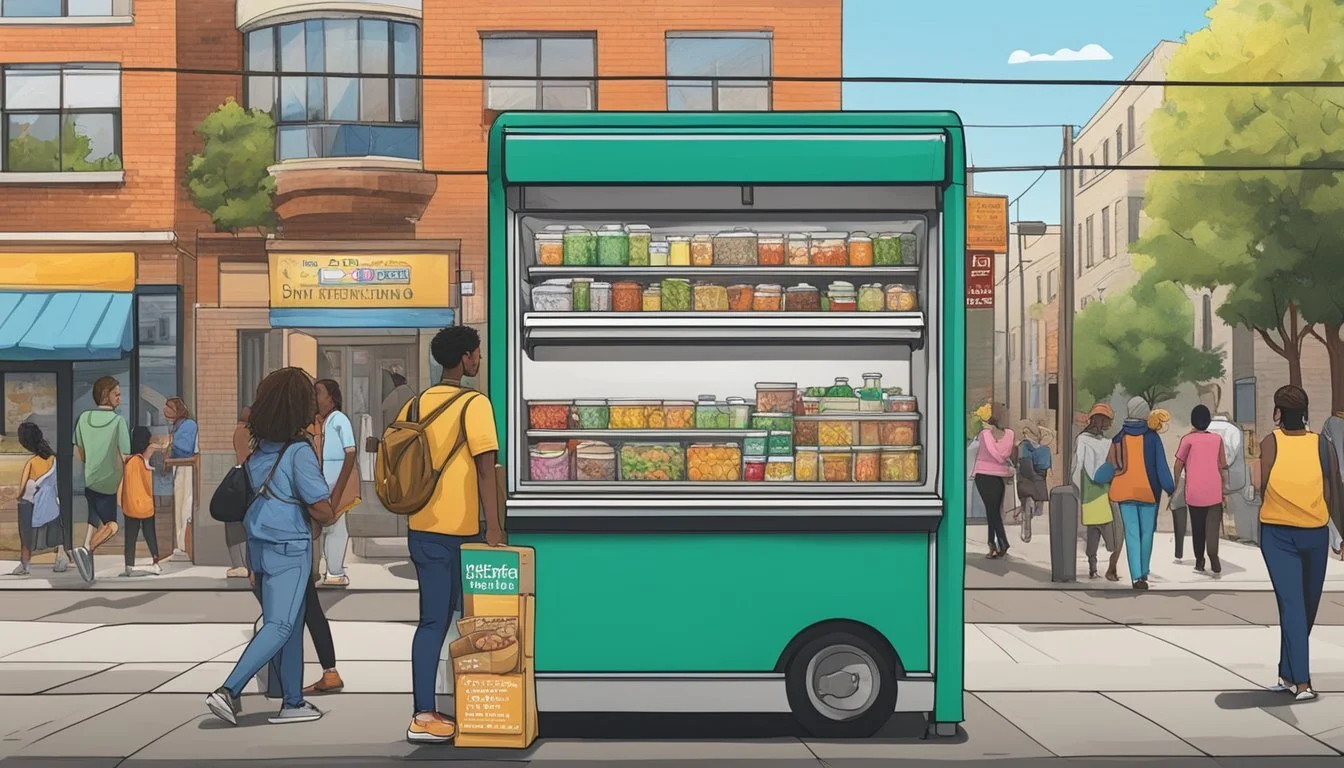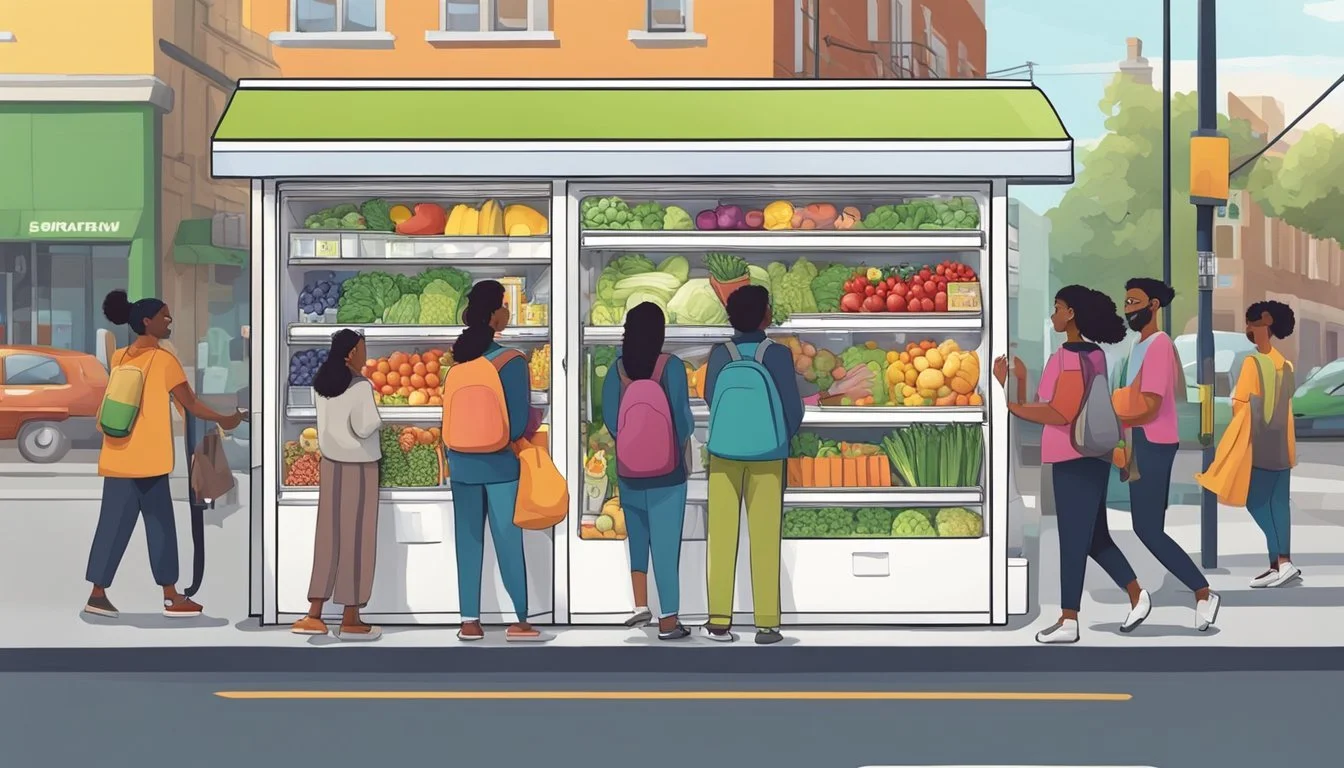Dayton, OH Community Fridge
Nourishing Neighborhoods Through Sharing
In Dayton, Ohio, an innovative approach to combating food waste and providing for those in need has gained traction through the establishment of Community Fridges. These fridges are strategically placed in public spaces, available for anyone to take from or contribute to, functioning on a simple yet powerful honor system. The initiative facilitates the redistribution of surplus perishable food, actively engaging the local community in collective responsibility and support.
Not only does this system make strides toward food security by making fresh, free food accessible to all community members, but it also offers significant economic benefits. A single community fridge in Dayton has the potential to redistribute several tons of food that might otherwise go to waste, providing households and community organizations with substantial savings on food expenses. The presence of such fridges reflects a community-wide commitment to sharing resources and fostering solidarity among residents of Montgomery County.
Concept and Purpose
The Dayton, OH Community Fridge embodies a grassroots solution to food insecurity and food waste. It serves as a hub where surplus food becomes a resource for those in need.
Defining Community Fridges
A Community Fridge is a public refrigerator where members of the local community can share and access surplus perishable food. These fridges are often placed in public spaces and operate on a 'take what you need, leave what you don't' basis. The concept hinges on the idea that accessible food sharing can help to both reduce waste and address food insecurity.
Goals of Community Fridges
The primary goals of Community Fridges include:
Redistribution of Surplus Food: Channeling excess food to those who need it rather than letting it go to waste.
Waste Reduction: Minimizing the amount of food that ends up in landfills by extending the lifecycle of perishable goods.
Community Engagement: Encouraging the community to participate in a shared economy based on trust and cooperation.
Benefits for the Local Community
Community Fridges provide several benefits, including:
Economic Relief: Households can save money on groceries by accessing the free food available in the fridge.
Environmental Impact: By reclaiming food that would otherwise be discarded, the fridge helps to reduce the environmental footprint of waste.
Social Inclusion: It creates a sense of community and support by allowing free and unrestricted access to all members, fostering an inclusive atmosphere.
History and Growth
Community fridges are a testament to collective action against food waste and hunger, showcasing significant progress from their European origins to American adoption, particularly in Dayton, Ohio.
Origins in European Countries
In the pursuit to combat food waste and address food insecurity, community fridges began in European countries such as Germany, Spain, and the UK. Spain's example of what is widely known as Solidarity Fridges provided a blueprint for such initiatives. Germany and the UK followed suit, establishing public refrigerators where residents can leave or take food freely, underscoring a commitment to sharing and sustainability.
Expansion in the U.S
The concept swiftly crossed the Atlantic, finding fertile ground in the United States. Civic-minded individuals and groups saw potential in this model for their own communities. An organized effort, sometimes in collaboration with the Community Fridge Network, saw various towns and cities establishing their own versions of community fridges to promote local solidarity and reduce food waste.
Dayton's Involvement in the Movement
In Dayton, Ohio, the community fridge initiative speaks volumes about local drive and community spirit. Launching its version, locally referred to as Gem City Community Fridge, Dayton embraced the honor system, encouraging the redistribution of food. This movement in Dayton demonstrates how communities can come together to offer food access solutions while simultaneously reducing waste and fostering connections between residents.
Dayton’s Community Fridge Locations
Dayton, OH, has embraced the community fridge concept, offering accessible public spaces and promoting the spirit of sharing and solidarity through food distribution. These fridges help in reducing food waste and provide food to those in need, operating transparently and fostering a sense of community.
Accessible Public Spaces
Community fridges in Dayton are strategically placed in areas that are easy to access. They ensure that nutritious food is available 24/7 to anyone in need without any restrictions. One such fridge can be found at the P&G Dayton Fulfillment Center, located at:
1800 Union Airpark Blvd
Vandalia, OH 45377
Located in the DHL Breakroom
Open: Monday – Sunday, 24 hours
These fridges are typically placed in locations such as fulfillment centers, allowing for both donations and pickups at any time of day.
Solidarity Fridges in Dayton
Solidarity Fridges, also known as Community Fridges or Honesty Fridges, are an extension of the city's community-oriented initiatives. They are run on the honor system, and provide a place for residents to both leave and take food as needed, promoting communal responsibility and support.
Dayton has witnessed a successful introduction of community fridges throughout the city. For instance, Encrete Lane, an area known for innovation and community projects, might be considered an ideal place to host a community fridge, encouraging local employment opportunities and sustainable living. While not all locations are listed, residents can look for these community fridges in public spaces and participating local businesses across Dayton, OH.
Operating a Community Fridge
Operating a community fridge in Dayton, OH involves firm adherence to health and safety protocols, respecting the honor system with clear regulations, and proactive community engagement and management to ensure the initiative's success and sustainability.
Health and Safety Protocols
When operating a community fridge, health and safety are paramount. Contributors must ensure that donated food meets the following criteria:
Freshness: All foods should be within their consumption date.
Packaging: Foods must be properly sealed or packaged to avoid contamination.
Storage: The fridge temperature should be regularly checked to be below 40°F.
They should also implement a 5 Step Guide to ensure consistent safety practices:
Inspect all donations for expiration and packaging integrity.
Clean the fridge regularly to prevent bacterial growth.
Label foods with donation dates and allergen information.
Remove expired or spoiled items promptly.
Provide clear food handling instructions for both staff and users.
Honor System and Regulations
Community fridges operate on an honor system, trusting individuals to take what they need and contribute what they can. However, specific regulations must be established to maintain order:
Usage Guidelines: Clear signage indicating what can be taken and encouraging reasonable limits to ensure availability for more people.
Donation Standards: A list of acceptable items and those prohibited due to local health regulations or potential allergens.
Local Laws may influence the regulation of community fridges; operators should consult Dayton's health and safety regulations to align with municipal standards.
Community Engagement and Management
Engagement is crucial in the management of a community fridge. Strong community links can drive the initiative forward through:
Volunteer Recruitment: A system to organize the staffing and maintenance of the fridge.
Educational Outreach: Campaigns to educate the community on how to use the fridge effectively.
Feedback Mechanisms: Channels for users and contributors to suggest improvements or report issues.
Operators must ensure they comply with GDPR Rules if they collect any personal data during the management process. Personal details should be protected and used solely for the operation and promotion of the community fridge.
Successful community fridge operation hinges on the cooperation and participation of local residents, businesses, and community groups, solidifying the foundation for a sustainable system dedicated to reducing food waste and supporting those in need.
Supporting Dayton's Community Fridges
Dayton's Community Fridges offer an innovative solution to combat food waste by redistributing surplus perishable foods. Local businesses and community members play a critical role in maintaining and supporting the operation and sustainability of these fridges.
Role of Local Businesses
Local businesses in Dayton contribute by providing access to surplus food that would otherwise go to waste. By donating excess products, businesses support not only the environment but also the community at large. In Dayton, food redistribution through community fridges has been shown to save households and community groups significant amounts on their food expenses.
Access Points: Accessible public spaces endorsed by local businesses.
Food Redistribution: Successful in diverting food waste, pivotal for sustainable community support.
Community Support and Donations
For the community fridges to remain stocked and operational, the support of community members is essential. Donations of food and time by community volunteers help to keep the initiative thriving. The fridges depend on the honor system, allowing all community members to contribute and withdraw foods as needed, fostering a sense of community trust and support.
Donation Types: Perishable food items in good condition.
Honor System: Ensures equitable access and contribution from all community members.
Through their contributions, both local businesses and community members demonstrate a commitment to reducing food waste and supporting those in need within the Dayton area.
Legal and Administrative Aspects
The legal and administrative framework surrounding the operation of community fridges in Dayton, Ohio, is rooted in compliance with local regulations and the protection of individual privacy. Initiatives must navigate the labyrinth of municipal codes and observe data protection laws, ensuring both community benefit and legal adherence.
Compliance with Montgomery's Regulations
Community fridge projects in Montgomery County, including in the city of Dayton, must adhere to specific regulations pertaining to food sharing and public health. Montgomery County's Administrative Services oversees various regulatory aspects relevant to such communal efforts. Entities like the Montgomery County Solid Waste Transfer Station play a critical role in the regulation of waste and the redistribution of perishable goods, a central function of community fridges.
Food Redistribution: Must not breach health and safety codes.
Waste Management: Collaborates with entities such as the Moraine facility to minimize food waste.
Montgomery County stipulates that surplus food distribution via community fridges must not contravene local health codes. Entities must ensure food safety and proper maintenance of the fridges.
Data Protection and Privacy
Data and privacy concerns are essential aspects of maintaining a community fridge's website and handling any related customer service inquiries. Entities responsible for community fridges, especially when operating online platforms or managing customer service, must comply with relevant privacy laws such as the General Data Protection Regulation (GDPR) rules, even if they are more stringent than local privacy laws.
Website Administration: Must incorporate clear privacy policies.
Customer Service Protocols: Should follow best practices to safeguard personal information.
Organizations must have transparent privacy policies on their websites, clearly outlining how they collect, use, and protect personal information. They must also ensure that their customer service teams are trained to handle personal data appropriately.
Future Prospects
The growth potential for community fridges in Dayton, OH, hinges on their ability to minimize waste and serve as a beacon of sustainable community support.
Sustainability and Expansion
Community fridges in Dayton have shown their value in reducing food waste and supporting local residents. One fridge alone can redistribute 12 tons of food waste and save the community over $10,000 in food costs. The goal moving forward is to expand these fridges across more neighborhoods. Strategic placement in high-need areas, combined with partnerships with local businesses and organizations, ensures that the fridges are both accessible and well-stocked, creating a self-sustaining cycle of giving and receiving.
Innovations in Community Fridge Models
Dayton's approach to community fridges could include innovations to enhance efficiency and service. Solar-powered refrigeration units, for example, offer a fully sustainable option that aligns with green initiatives. This technology has been successfully implemented, underlining the viability of using renewable energy sources to power community amenities. By adopting such eco-friendly solutions, Dayton sets a positive precedent for other cities looking to implement or upgrade their community fridge programs.









